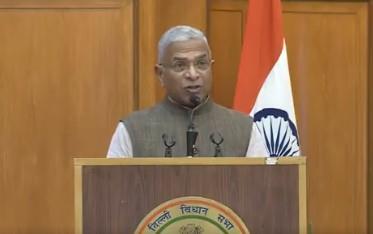
Democracy Rooted In Indian Traditions: Rajya Sabha Deputy Chairman
Addressing the second session on the first day of the All India Speakers' Conference 2025, held at the Delhi Legislative Assembly, the Rajya Sabha Deputy Chairman stated that India's claim as the Mother of Democracy is not a modern slogan but a truth rooted in thousands of years of tradition.
The session, themed 'India – The Mother of Democracy', was a central feature of the Centenary Celebrations marking 100 years of Vithalbhai Patel's election as the first Indian Speaker of the Central Legislative Assembly. Delhi Speaker Vijender Gupta and Deputy Speaker Mohan Singh Bisht were also present on the occasion.
Harivansh Narayan Singh recalled that from the Rigveda onwards, India's civilisation invoked sabha and samiti as institutions of collective deliberation, and through epics such as the Ramayana and Mahabharata, leadership was tied to sacrifice, morality, and responsibility towards the people.
Singh added that Indian thought always held morality and politics together, unlike in Western traditions, where the two were separated.
He said that while Greek thinkers like Plato and Aristotle doubted democracy and European thinkers later gave primacy to power, Indian philosophy insisted on dharma as the basis of governance.
He contrasted Niccolo Machiavelli's idea that it is better for a ruler to be feared than loved with (Chanakya) Kautilya's Arthashastra, which declared that“the king's welfare lies in the welfare of the people.”
In India, he observed, the king had no existence apart from the people.
The Rajya Sabha Deputy Chairman stated that democracy in India was visible not only in scriptures but in lived institutions.
From village panchayats to Buddhist sanghas, from the republican ganrajyas of Bihar and Uttar Pradesh to the teachings of Ashoka, from Bhakti and Sufi movements that deepened equality to Surendranath Banerjee's vision of India as a federation of villages, the Indian tradition nurtured democracy as a way of life.
He reminded that even Western scholars in the nineteenth century were struck by India's ability to preserve unity in diversity through democratic practices.

Legal Disclaimer:
MENAFN provides the
information “as is” without warranty of any kind. We do not accept
any responsibility or liability for the accuracy, content, images,
videos, licenses, completeness, legality, or reliability of the information
contained in this article. If you have any complaints or copyright
issues related to this article, kindly contact the provider above.


















Comments
No comment